Stephen Sondheim
March 22, 1930 - November 26, 2021
Countless obituaries, tributes, eulogies, and “In Memoriam” articles reiterated the indisputable fact that the death of Broadway legend Stephen Sondheim signaled the end of an era in American Musical Theater. And indeed, the breadth of his impact is difficult to overstate. Stephen Sondheim almost single-handedly changed the look, sound, and content of the American musical. Transforming the popular medium that once strove for nothing deeper than “pleasing the tired businessman” (i.e., to amuse and entertain, not instruct or strain the brain) into a sophisticated and challenging art form illuminating complex societal themes and exploring the darker corners of the human condition. It’s impossible to imagine the likes of his particular genius will ever be seen again.
 |
| Sonheim in 1973 |
But to me…a gay man who discovered this brilliant composer-lyricist during my floundering adolescence in the Sexual Revolution/Gay Liberation ‘70s, it’s hard not to look upon the obvious tragedy of Stephen Sondheim’s death at age 91 as simultaneously representing a kind of triumph. A triumph of survival, a triumph of the indomitability of the creative voice, and certainly a triumph of a queer artist's personal journey (from being closeted, coming out in his 40s, to [shades of "Marry Me a Little"] getting wed at the age of 87) in a nearly 70-year career.
 |
| Sondheim and husband Jeff Romley - Wed in 2017 |
For what’s not triumphant in being a gay man surviving the devastation of the AIDS plague of the ‘80s and living to the astoundingly ripe old age of 91? It’s certainly a triumph that the trajectory of Sondheim’s long career dramatizes the struggle of the American LGBTQ experience: Sondheim’s first Broadway show (1957s West Side Story) was the creation of no less than FOUR societally-mandated closeted gay and bisexual men. By the time of his death, Sondheim was an out-and-proud, world-renowned public figure legally wed to his husband of four years.
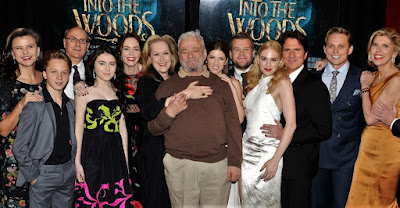 |
| Sondheim with the cast of the movie version of Into the Woods |
As one of Broadway’s most lauded composer-lyricists (8 Tony Award wins - including an Honorary Lifetime Achievement in Theater Award, 8 Grammys, a Pulitzer Prize, a Presidential Medal of Freedom, and more) Hollywood beckoned Sondheim from the start. And of his 18 theatrical productions, six have made it to the screen to date. The work he created specifically for the movies includes composing a score for French director Alain Resnais, writing original songs for several feature films (one even garnering him an Oscar win), and collaborating on the screenplay of a murder mystery with his friend and rumored lover Anthony Perkins.
The relative or comparative success/failure of Hollywood’s adaptations of Sondheim’s work has sparked much unnecessary debate over the years. In the end, it's Sondheim himself who comes across as the level-headed mediator, what with his understanding of the differences between the mediums of film and theater, and therefore being considerably less bent out of shape than his acolytes by the often necessary compromises required in bringing his theatrical works to the screen.
I think evidence of Sondheim's easygoing philosophy can be found in his music.
One of the more consistent themes running through Sondheim's work is that, while idealism is both an elemental and essential part of being an artist, a lover, a character in a fairy tale, a dreamer, a suburban married couple, or even a sociopathic killer; the achievement of perfection itself is something unattainable. There can never be such a thing as perfection or "happily ever after" where human beings...in all their flawed complexity...are involved.
So many of his musicals end with characters thinking they are “settling” for the less-than-perfect when the overarching theme stresses that once one abandons illusion and fantasy (which makes us question whether we're happy "enough" or if our happiness is the "right kind"), it opens us up to realizing that in most instances, true happiness is never ideal, and that it rarely ever looks the way we expect it to. More often than not, when discovered, it's found in the only place it can ever truly be: in the here and now, wherever that may be, and whatever that may look like. Accepting who we are, what we have, and finding that there is both happiness and contentment within the imperfect, is, I think, the key to happiness and what it means to grow up.
- "In The Movies" - from Sondheim's first musical Saturday Night - 1955 (unproduced until 1997)
“In the Movies” is a comic musical number calling attention to the discrepancy between life as we know it and life as depicted on the big screen. In the end, the song makes the case that wishing for reality to be more like the movies is an exercise in futility when it’s precisely life’s deficiencies that make movies so pleasurable (and necessary!). Better to relax, sit back, and enjoy these idealized fantasies for what they are. Why dwell on the unhappy thought that life is so seldom as magical as the movies when the greatest gift that movies offer us is the magic of fantasy? Why not just sit back and “settle for the dream”?
That repeated lyric, with its echoing of the Sondheimian ethos of accepting things as they are…accepting the things you cannot change, feels just right for the title of my brief look at the uneven cinema legacy of the man who became the face of American Musical Theater.
 |
| In 1971 I fell in love with the OBC album of Sondheim's Company (1970). In 1993 got to see the original cast perform it in concert. |
I suspect theater fans will always prefer their Sondheim onstage and lament that his film adaptations inevitably fall short. And I can see their point. Live theater presents the uncompromised vision and is different each time you see it. But live theater is not as available to some as it is to others. Certainly not as available as film.
I'm a movie guy and a Sondheim fan to boot, so my attitude is that while I would love it if every screen adaptation of a Sondheim show was "perfection," there is no such thing. And certainly, when it comes to film, what's done is done. There's no matinee the following day where problems can be fixed.
In any discussion on the topic of whether the movies have ever done justice to the work of Stephen Sondheim, my answer would be a qualified no. But instead of blocking my blessings by playing "It Would Have Been Wonderful," how much better it is for me to sit back and simply appreciate the rare gift it is to have any of Stephen Sondheim's genius preserved on the screen at all. It's a dream I'm more than happy to settle for.
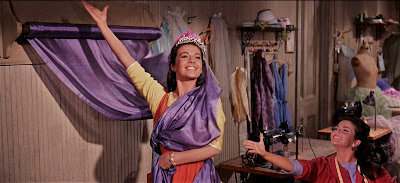 |
| WEST SIDE STORY - 1961 |
 |
| GYPSY - 1962 |
Directed by Mervyn Leroy and adapted from the 1959 Ethel Merman Broadway musical. Hitting two for two, Sondheim’s second Broadway hit (this time supplying the lyrics to Jules Stein’s music) became his second movie adaptation and second collaboration with Natalie Wood. Controversially cast in place of the bombastic Merman, the vocally-manipulated Rosalind Russell. A delightful, relatively faithful adaptation, Gypsy is another film I’ve exhaustively covered in an earlier post (hint: I’m crazy about it), my only gripe being that it cuts one of my favorite songs, “Together Wherever We Go.”
 |
| A FUNNY THING HAPPENED ON THE WAY TO THE FORUM - 1966 |
 |
| THE LAST OF SHEILA - 1973 |
Directed by Herbert Ross from an original screenplay by Stephen Sondheim and actor Anthony Perkins. Sondheim combined his passion for puzzles and games with his early experience writing for television in the ‘50s (he wrote several episodes of the comedy program Topper) and came up with a doozy of an all-star whodunit set on the French Riviera. The Agatha Christie-style plot is as complex and twisty as any Sondheim melody, and it’s easy to imagine Perkins contributing a great deal to the gossipy, insider feel of the film's movie-industry setting and its cast of unsympathetic opportunists. The Last of Sheila is another film I’ve written about in a previous post…and by now you know the drill. I’m crazy about it.
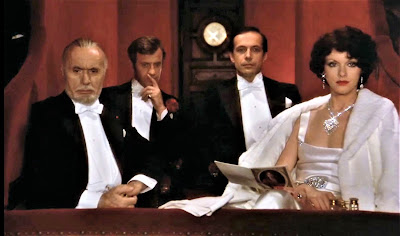 |
| STAVISKY - 1974 |
Directed by Alain Resnais (Last Year at Marienbad). Sondheim was approached by Resnais (who professed to be a fan of the composer) to write the period score for this stylish crime noir set in the early ‘30s and based on the life of real-life political swindler, Serge Alexandre Stavisky. Resnais’ film is an Art Deco visual feast to which Sondheim contributes a breathtakingly lush, sweepingly romantic score. Even if you never have the opportunity to see the sumptuous motion picture, you owe it to yourself to get your hands on the soundtrack. The music is beyond exquisite.
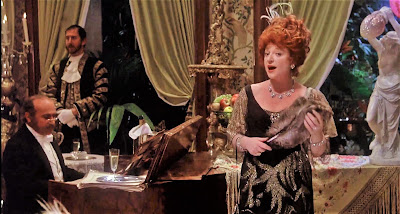 |
| THE SEVEN-PER-CENT SOLUTION - 1976 |
 |
| A LITTLE NIGHT MUSIC - 1977 |
 |
| REDS - 1981 |
 |
| DICK TRACY - 1990 |
 |
| THE BIRDCAGE - 1996 |
 |
| SWEENEY TODD: THE DEMON BARBER OF FLEET STREET - 2007 |
 |
| INTO THE WOODS - 2014 |
Directed by Rob Marshall and adapted from the three-time 1987 Tony Award-winning Broadway musical. Remarkably, this film version of Sondheim’s grim adult take on Grimm’s fairy tales marks my first time ever seeing Into The Woods (1984’s Sunday in the Park with George had put me off Sondheim for a bit), so I’m willing to accept the tiresomely patronizing assurances from my theater-geek friends that until I watch the complete production performed by the original Broadway cast for cable TV in 1991, I STILL haven’t seen Into the Woods. Be that as it may, in the spirit of discovery, I must say I had the best time watching Marshall's film. Wonderful performances throughout, and that absolutely superb and complex score. Subsequent revisits…with fast-forward remote at the ready… have been less ecstatic. The film was nominated for 3 Oscars.
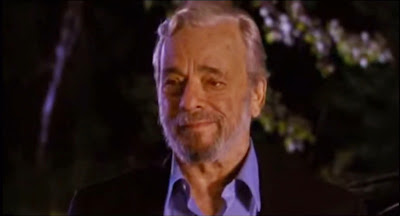 |
| CAMP - 2003 |
 |
| WEST SIDE STORY - 2021 |
 |
| TICK, TICK...BOOM! - 2021 |
I honestly tried, but I found it impossible to make it through even the first 20 minutes of 2021's Tick, Tick...Boom!, so I missed out on experiencing Sondheim's audio-only "cameo" (as himself) in dramatic context (I watched a clip of the scene on YouTube). In a mini-monologue written by Sondheim himself, his voice is heard on an answering machine giving up-and-coming composer Jonathan Larson (Andrew Garfield) a timely pep talk. The film, set in 1999 gives us Stephen Sondheim in the flesh, portrayed by actor Bradley Whitford of Get Out (2017). My personal feelings about the movie aside, I can't imagine a greater testament to Stephen Sondheim's enduring brilliance than his being depicted in this film as an icon of musical theater, a patron saint and inspiration to young artists.
GLASS ONION - 2022
"Sorry, Blanc. You're thrown out of the airlock. It's a no-brainer." - Those are the only lines spoken by Stephen Sondheim in this, his last screen appearance. Playing himself, he appears in a COVID lockdown Zoom gathering with Broadway legend Angela Lansbury (also her final screen appearance), NBA All-Star Kareem Abdul-Jabbar, and actress Natasha Lyonne. They are all playing the online video sleuthing game "Among Us" with world-famous fictional detective Benoit Blanc (Daniel Craig) in this, his second screen mystery (following the character's debut in Knives Out - 2019). Sondheim's appearance as gamer "Steve S." is but a cameo, but in context, it's an ideal screen sendoff for one of popular culture's most well-known game-players. A screen farewell made all the more satisfying because Benoit Blanc's fondness for Sondheim music was wittily referenced in Knives Out, and because Rian Johnson's murder mystery Glass Onion consistently pays loving homage to Sondheim & Perkins' twisty & bitchy 1973 whodunit The Last of Sheila.
*****
Stephen Sondheim's legacy for me is indelible and rich. For some reason, he seems to have been the perfect composer to introduce me to musical theater at an impressionable age. He set a very high standard. That his reputation continues to grow and his work is recognized and lauded by an entirely new generation makes me glad that at least a few of his shows have been preserved on film.
 |
| My Favorite Stephen Sondheim Musical Scores |
My Top Five Favorite Sondheim Songs:
"Every Day a Little Death"
"Not While I'm Around"
"Losing My Mind"
"There's Always a Woman"
"Side by Side by Side/What Would We Do Without You?"
Readers: No one should have to pick a "favorite" from Sondheim's sizeable catalog of impossibly beautiful (and riotously funny) songs, but if you care to share a particular Sondheim composition you enjoy or that means something to you, I'd be interested to know.
BONUS MATERIAL:
Liza Minnelli sings Sondheim's "Losing My Mind" - from her Results album -1989
I know a music video doesn’t officially fit the “Sondheim in the Movies” theme of this tribute, but this is included here because Oscar-winning, Miss Show-Biz herself, Liza Minnelli, delivers more deliriously extravagant drama, anguish, camp, and genuine pathos in 4 ½ minutes than you’ll find in a Douglas Sirk/David Lynch film festival.
For those desperate to make a movie connection; imagine this video as a 20-years-later short film sequel to Minnelli's The Sterile Cuckoo (1969) with an adult Pookie Adams still getting herself into obsessive, one-way relationships.
Pet Shop Boys (Neil Tennant, Chris Lowe) produced this infectious synthpop dance version of Sondheim’s torch ballad from Follies. On the strength of Minnelli’s committed, full-throttle performance, I also find this majestically melodramatic music video…which even features a nod to the Emcee in Cabaret…to be delicately moving. Directed by Briant Grant.
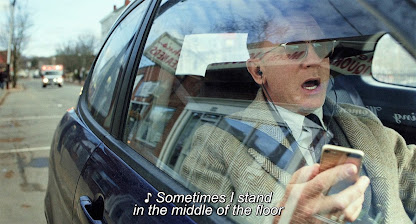 |
| In the comic whodunit Knives Out (2019), Daniel Craig plays a gay master detective with a fondness for Sondheim |
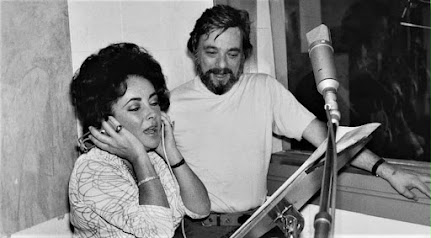





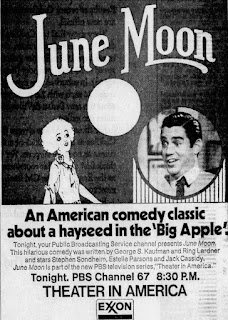

At the moment I'm quite enamored with
ReplyDeleteJudy Collin's rendition of Take Me to the World.
That's such a beautiful song! And thanks for introducing me to Collin's version. I was unaware she'd done an album of Sondheim songs.
DeleteHappy New Year Ken!! Thank you for all the enjoyable and entertaining thoughts you have provided. Peace out from your big fan James.
ReplyDeleteThank you so much, James. And with sincere gratitude for your readership and contributions throughout the past year, I wish you all the best in 2022. Happy New Year!
DeleteFantastic, thoroughly enjoying overview, Ken! I LOVE that you included the bonus of Liza's "Losing My Mind," which is probably her finest moment on a studio album (vs. soundtrack). I actually saw "Tick Tick ... Boom!" the same day I saw "West Side Story" (2021) a few weeks ago without really know what I was in for. I'll be curious to hear your thoughts when you see it!
ReplyDeleteThanks, Christian. I'm so happy you enjoyed it.
DeleteYes, to whatever sparked the idea for a collaboration of Pet Shop Boys, Liza, and Sondheim, I'm forever grateful. Results is such a terrific album.
And I'm so jealous you've seen West Side Story! I'm going to have to wait for streaming unless I rent out an empty theater.
The only reason I haven't seen "Tick, Tick...Boom!" is that I don't know what to expect. I'm not a fan of RENT and wonder if that would factor into my experience.
Thank you very much for continuing to check out my posts, and for the added bonus of your contributing to the comments.
Perhaps it's a tad obvious but I've always liked "Send in the Clowns." I first heard the orchestral version on some record of my parents and then I came across the sheet music and actually learned to play the song on the piano. I played it enough that I could play the first few bars from memory for a while (don't ask me to now). I knew nothing about the musical it came from (or Sondheim for that matter) until later. Fast forward many many years and I have just bought my first smartphone and realize that I can access Youtube on it. Don't ask me why but the first thing I looked up was "Send in the Clowns" and came across Dame Judi Dench doing a scene from "A Little Night Music" singing this song. As I listened to her interpretation, the lights went on...so THAT'S what the song is about. I don't know why it took me so long to realize the song is about regret and lost chances. I knew it was basically a sad song but maybe because I'd never heard it in context, it just took awhile to figure it out (or maybe I'm just not quick on the uptake generally). Other favorites are "Ladies who Lunch" and "A Little Priest" (which I just find morbidly funny).
ReplyDeleteMe too "Send in the Clowns", obviousness be dammed.
DeleteHi Ron
DeleteThank you for taking us through your discovery and latter awareness of "Send in the Clowns" which I think is a far from obvious choice and one of Sondheim's most beautiful
and poetically melancholy songs. I especially like that you knew the melody before the words. Sometimes when I listen to instrumental versions of Sondheim's songs, it's like discovering an entirely new song.
Lastly, I can wholly relate to "getting" the meaning of SEND IN THE CLOWNS much later. I personally think the meaning of many of Sondheim's song change as we get older. That's certainly been the case with me.
I always had one interpretation of the song, and I don't think I was wrong, but a theatrical director once broke down for me how he directed a performance of the song, and I was so flummoxed that I hadn't picked an on an aspect similarly lost to me before: "Are you fucking, kidding me?" element when someone puts their best efforts forward and things turn out absurdly opposite if what you hoped.
I'm now going to take a look at Judi Dench's performance on YouTube! Thank you for contributing, Ron.
For those interested, this is the link to the clip I mentioned in my comment: https://youtu.be/04E8Y8nDfRQ
Delete...and loulou
DeleteThat's the perfect attitude to have about the things we enjoy! They're ours. And one person's "obvious" is another person's "classic."
Thanks for posting the link, Ron. The caption citing Dench's performance as "The definitive 'Send in the Clowns'" gets no argument from me.
Ken you hit it out of the park with this one (and I don't mean Sunday in the Park with you know who.). It is a great Sondheim appreciation that educated me, someone who never worshiped at the altar of Sondheim.
DeleteThank you, loulou. And I must say it's nice to have a little point/counterpoint with an artist as revered as Sondheim. When perhaps too much fandom dominates an artist's legacy (like I find with Bob Fosse) it can be refreshing -and helpful- to be reminded that even the most revered are not to everyone's taste. Again, that's how it should be. Always hated how theater folks try to shame non-Sondheim fans. Given how many flops he's had and how many songs he has written that were rejected, I think Sondheim would be the first to admit that he's fine with people being able to take or leave him.
DeleteI'm just pleased that you found the article a worthwhile read! Thank you very much!
(I still hate Sweeney Todd).
DeleteHa! Probably not as much as I hated "Sunday in the Park with George"...or "Pacific Overtures."
DeleteAwesome! This was such a treat and fun to read. I learned a lot about things he contributed to of which I wasn't previously aware. I surely did see WSS and AFTHOTWTTF on TV, but otherwise really wasn't aware of him until I began doing theatre in 1994. So Liza's rendition of "Losing My Mind" was one of my earliest bits of exposure to his music (and I thought she never looked better in her life than in that video! I also enjoyed practically that entire album.) Then "Dick Tracy" was the second time I was conscious of him. Later, I was either IN or AT many shows of his and grew to understand why he was so important and appreciated (and, to some vocalists, confounding due to the complicated style of some of his songs.) As you say, it's so difficult to pick a favorite song, but I know that one of mine would be "Not a Day Goes By." Oh, and slightly off-topic, I just LOVED the performance of "Turkey Lurkey Time" in "Camp!" Glad to see the movie mentioned here. Thanks!!
ReplyDeleteThank you, Jon! So pleased you enjoyed this.
DeleteLike you, I was familiar with both WSS and Forum before I ever really knew the name Sondheim (In 1971 remember being completely stunned learning that the new composer I thought I'd discovered with that COMPANY album was the same guy behind GYPSY).
Your discovering Sondheim through Liza's RESULTS album is pretty cool (And I'm with you, she looks AMAZING in the series of music videos released for that album.) As is the fact you actually got to appear in a few of his shows in your career.
Your selection of "Not a Day Goes By" almost made my Top 5 list. No one does tortured longing like Sondheim.
Turkey Lurkey Time has been a favorite since I saw it performed on the TONY AWARDS when I was a kid (and, as far as influential composers go, in my life Bacharach wrote my soundtrack) I introduced it to my partner and he wasn't quite sure what to make of it, although he kicked ass dancing to it when I choreographed a routine to it for class). I remember liking that song was resurrected in CAMP.
Dear Ken: Happy New Year!
ReplyDeleteWhat a wonderful essay, and a really moving tribute to Sondheim and his genius. I've never read the underlying theme of Sondheim's work summed up as effectively as you have here (settling for, and finding some pleasure in, the best we can do in this imperfect world).
Sondheim and I have had a long and complicated relationship (not that I ever actually met him!). In my high school years (early 1980s), Sondheim was God among the theatre geeks. One of my best friends was a particularly big Sondheim fan (her favorite shows at that time were "Little Night Music" and "Sweeney Todd").
At the time I found Sondheim unsettling. I was not yet ready to move beyond a philosophy of simple optimism, hoping that things basically turn out for the best.
Today, I'm still pretty optimistic. But I have a greater appreciation for Sondheim's recognition of the failings and limitations of this world--how people stumble and fall but have to keep trying.
There's just one point in your essay, Ken, I would disagree with: that Sondheim was the first Broadway composer/lyricist to move beyond the "tired businessman" formula for musicals. To a Broadway buff like me, "them's fightin' words!" (as Yosemite Sam might say). Prior to Sondheim's debut with "West Side Story," shows like "Show Boat," "Of Thee I Sing," "Porgy and Bess," "Carousel," "Lost in the Stars," "The King and I," "The Most Happy Fella" and "My Fair Lady" (to name only a few) all contained complex characters, elements of tragedy and/or recognition of life's realities. Could tired businessmen still enjoy at least some of these shows? Of course. Did Sondheim move Broadway theatre forward in a dramatic way? No question. But I prefer to see Sondheim still as owing a debt to the creators who came before him (especially Oscar Hammerstein, who was Sondheim's mentor), while those creators who came after Sondheim (Maury Yeston, Jeanine Tesori, Michael John LaChiusa, Scott Frankel and Michael Korie) owe a debt to Sondheim's work even as they move in different directions.
I don't love all of Sondheim's shows (I'm curious to know what you didn't like about "Sunday in the Park with George," since I really don't care for that one, either), but many of them have scores that I listen to again and again. Some favorite songs:
Gypsy: The whole darn score--can't really pick out any song as a favorite
Funny Thing Happened on the Way to the Forum: "Love, I Hear" and "Impossible" (neither of which, if I recall, made it into the film version) . Those theatre commentators who praise Sondheim's lyrics but claim he is lacking as a melodist really need to re-listen to the overture of "Forum": such striking melodies and unusual harmonies!
Company: The title song, a number I would classify as truly exciting to hear
Follies: "Don't Look at Me," "The Girls Upstairs"
Merrily We Roll Along: "Like It Was," "Now You Know" (even if portions of the latter are nearly impossible to sing intelligibly)
Passion: The cast album presents the score as a continuous suite, and I love hearing it that way--there are moments of incredible beauty throughout the score
Saturday Night: "So Many People"
Hi David
DeleteThank you for reading this.And I’m very happy and flattered you enjoyed it.
I was amused reading about your “complicated relationship” with Sondheim in high school. It speaks well of your teen years that you likely missed the sullen-nihilist stage, which is the part Sondheim’s dark and funny music tapped into when I was young.
And certainly, the somewhat obnoxious Sondheim as God cultism hammered me over the head when I moved from film into dance in my early 20s.
Thanks for providing so much backstory/theater history identifying the progenitors that Sondheim himself would be the first to credit as having paved his way and influenced his work. I read Sondheim’s 2 volume memoirs, and he is refreshingly unenchanted with himself and gives credit liberally to those who encouraged him and inspired him.
I don’t see you and I having a disagreement on this point, simply that your paragraph highlighting theater’s dark origins serves to effectively fill in the blanks for the “almost” part of my sentence: “Stephen Sondheim ALMOST single-handedly changed the look, sound, and content of the American musical.”
I’m not a Sondheim completest as far as my enjoyment of his shows is concerned. I have no profound reason for not liking SUNDAY IN THE PARK WITH GEORGE, save that I found it to be dull to the point of hostility. The only happy memory I associate with it is that I met Bruce not long after his university had put on a production of the show, so every time I went to visit him at the school’s theater department, I had to walk through the scene shop where a giant 3-D rereation of Seurat's A Sunday Afternoon on the Island of La Grande Jatte still stood. It seemed so romantic.
Lastly, thanks for sharing your list of Sondheim favorites. I especially like the songs you selected from FORUM and FOLLIES. And I applaud your referencing “So Many People” a song I like but often forget about. Perhaps you will also get me to listen to PASSION again. I wasn’t to keen on it when I first heard it, and never gave it a second chance.
You’re very correct in noting that Sondheim’s reputation for not writing songs with a melody is a bit overemphasized. He has written many lovely melodies.
And your observation affords the sign-off opportunity to post a favorite lyric from a 1995 song sung by Kaye Ballard ( I wish I could remember the songwriter) called “My Big Mouth Kept Me Out of the Big Time”:
“I asked Stephen Sondheim to write a song for me. I said, ‘Only Stephen, next time…please, can it have some melody?’ I should have Shut Up! But Nooo!”
Happy New Year, David!
After reading this wonderful piece on Sondheim, I was inspired to look for some of the musical pieces mentioned.
ReplyDeleteMy favorites to date are Millicent Martin singing "I Never Do Anything Twice" from The Seven Percent Solution.
https://www.youtube.com/watch?v=7av9krAJQ8g
and
Raul Esparza singing "Take me To the World" from Evening Primrose.
https://www.youtube.com/watch?v=1O8-uT23oho
I find both brilliant renditions of these two very different Sondheim compositions addictive.
Hello "Unknown" -
DeleteNot sure if this is your first visit to the blog, but I thank you for reading this post and for your compliment. Most of all, a big thanks for the contribution of your favorites.
I've always liked the way Millicent Martin sang "Madam's Song", but I've never seen her sing it and this performance is delightful. But the rendition of TAKE ME TO THE WORLD you linked may well be my all-time favorite version. I've only heard women sing it before and Esparza's interpretation is just magnificent. It have me waterworks...which I always appreciate.
So a BIG thanks for introducing me to that.
Wow! Such a great piece Ken! It certainly is informative to one like me who knows so little about Broadway, but enough to know that Sondheim refined & polished the artform to another plateau altogether. His way with words is quite intriguing.
ReplyDeleteI thought I didn't much care for his songs, but on second consideration I adore quite a few: "Tonight", "Not While I'm Around" being just a couple. And most certainly Liza's "Losing My Mind".
But anyhow it's just wonderful to read your knowledgeable and brilliantly contexted treatment: my takeaway has to be that it's a terrific primer for a relative newcomer to the Sondheim ouvre!
Hello Rick
DeleteI'd hoped this piece would serve as a kind of Cliff Notes Sondheim-101 (you would not believe the sheer volume of books related to Sondheim there are out there) and your very kind comment makes me think I at least came close to achieving my goal.
Part of an early draft includes an "accessible Sondheim" list of songs most likely to find favor among non-Sondheim fans because of their beautiful melody and lyrics and their ability to be appreciated out of context.
I think you have named some of his loveliest songs and most moving lyrics. Over the years a kind of snob factor has attached itself to Sondheim that flatter the egos of his fans more than they reflect his attitude about his own work.
I'm notorious for my name-dropping (It's part of my charm, I insist) but I'll refrain from my usual and just say that a longtime friend of Sondheim was a client of mine for many years and she said that while he never sought to write a 'hit" he was always in 7th heaven when the masses took one of his songs to their hearts. He was apparently thrilled with Minnelli's interpretation of Losing My Mind and wanted updates on how it was doing on he charts.
Thank you for reading my post and sharing your song selections with us, Rick.
It's probably sacrilege, but here goes, Ken: I believe Sondheim regretted that he only did the lyrics, and not the music, for West Side Story. But is there really anything wrong with the music in West Side Story, or Gypsy, for that matter? It's no accident that after decades of nothing if not prolific output, only one of Sondheim's songs, Send in the Clowns, became a hit with the general public. The man was a genius, of course, and added an immeasurable level of depth and emotional sophistication to our music; but maybe his work is a little too sophisticated, a little too rarefied, for most people. That one element of Pop-songcraft that you find in older musical theater hits, a sort of Brill-Building talent for creating those toe-tapping 'hooks', something even the friggin' Archies had down pat, was sorely lacking in Sondheim. In a Rolling Stone interview not long before his death, John Lennon once expressed amazement at Paul McCartney's seemingly innate, God-given ability to sort of effortlessly rattle off musical-wonders-in-miniature, instantly hummable songs like In My Life or Here, There and Everywhere. And as a musician, I believe this is a gift you either have or you don't. Even Billy Joel has this gift. Sondheim, whatever else he gave us, didn't.
ReplyDeleteThat being said, I am always impressed watching footage of Sondheim teaching his work to actors or theater students; unlike other mega-successful gay men, there isn't a trace of The Diva. The man appears warm, generous-spirited, even kind. And the older I get, the more I think those are the only qualities that really matter in this troubled world of ours.
Thanks, Ken!
Hi Rick D
DeleteI love how well you made your (thoroughly NON-sacrilegious) point, clarifying specifically what you like, enjoy, and look for in a musical. If Sondheim isn’t the one to provide those things, I think you are fully correct in your subjective preferences -- finding his work impressive, but not particularly your cup of tea. That’s the way it should be.
I think the position you take rests on the idea that wide popularity and/or the creation of “hits” and hummable tunes is the preferred goal for an artist…possibly even a measuring stick to access the material’s worth or value. Within those parameters, Sondheim’s work would appear to fail or fall short. But looking at his body of work and recognizing that not everybody likes the kind of pop tunes, ditties, and hummable songs that typified Broadway for decades, I would take the position that Sondheim purposely chose to challenge such long-held standards.
Capitalism says all music must be “likable”…an artist might posit that music is to express, and since not all feelings are good and that life is complex, maybe music can be difficult, atonal, complex. Something challenging to classic standards of what constitutes and defines music.
I think Sondheim was largely an artist working in a populist medium, and his efforts to narrow that divide in theater is what fueled his genius. When dealing with art, a lack of popularity isn’t really a shortcoming. Especially in the climate of social media. Facebook, Instagram, Reddit, and Twitter have given us a sobering glimpse at just who “the public” is. I don’t see how any artist could equate acceptance by the masses as any reasonable gauge of the quality of one’s work.
Personally, I’m a major fan of the old-fashioned sound of Broadway musicals, and the further Sondheim moved away from that, the less fond of his work I became. But that’s just me. I KNEW that I was happy where I was and didn’t want to grow in the directions Sonheim was taking things. That doesn’t make Sondheim less skilled any more than it makes my personal tastes “right.” They’re right for me, but it’s a definite arrested development I seek…I like music to sound like it aways had. But I applaud Sondheim taking it elsewhere, Even if it’s not a journey I care to go on.
To me, Hollywood today (Marvel Universe, Disney everything, “theme park movies” ) is what Broadway has become save for the occasional Sondheim musical for grown-ups.
So you’re right, Sondheim doesn’t write toe-tappers or chart-busters, and he’s no McCartney or Billy Joel. But in saying that, I’ve a hunch we’re paying Sondheim the highest possible compliment possible!
And to your last paragraph, I wholly agree that it is quite the experience to see Sondheim working with young people on his songs. My partner and I were recently discussing just that thing (after checking out so many of his videos on YouTube). He indeed comes across as the best sort of teacher: exacting, but kind.
Thank you for introducing an interesting thinking-point in your thoughtful contribution, Rick. I appreciate your level of engagement in the topics of these blog posts.
"The man appears warm, generous-spirited, even kind. And the older I get, the more I think those are the only qualities that really matter in this troubled world of ours." Nothing to say but that I couldn't agree more!
DeleteBeautifully put. Always flabbergasted by your thoughtful, considered responses, Ken. Thanks!
ReplyDeleteArgyle here. Thank you, Ken, for another wide-ranging and thought-provoking essay.
ReplyDeleteTo keep me from straying too far, I’m just going to take this in order, hitting the points where I might have a worthwhile comment:
Did Pat Ast have something to do with “Evening Primrose”? I’ve looked and couldn’t find anything. I love her. Maybe this was just one of those legendary Hollywood/Manhattan sing-alongs you sometimes hear about. What’s wrong, Marisa? Sing!
I like “The Last of Sheila”. It took me years to see. I need to re-watch. Maybe someone should turn it into a musical. That would be kind of perverse.
I had forgotten about wanting to see “Stavisky”, so this spurred me to put it on my Criterion Channel watch list. Alain Delon and a whole score! And that woman is beautiful.
I like “Reds” - the witnesses, Vittorio Storaro, lots of things - but I always feel a little let down in the “sweeping epic” department. The very good still you chose captures the spark that I never quite feel between Louise and John. When the end comes, I want to be moved but am not quite. Still, I’m so glad that he made it, and I will continue to watch it. I think I remember the theme; I’ll pay more attention next time.
Madonna has always been my Elvis - my exact contemporary, wonderful, perplexing. Sometimes I doubt the whole thing. But she has an amazing way of getting incredible opportunities and this was certainly one: introducing a string of Stephen Sondheim songs. As usual, I think she worked really hard and pretty much pulled it off. That she knew it was a unique and much envied opportunity is a tribute to her intelligence, I hope. Again, I liked the movie, but it never quite took off for me.
I am so glad we share a similar reaction to that Mike Nichol’s (??!) film.
“Send in the Clowns” by Judy Collins was probably the first Sondheim song that made me wonder, who wrote this? Eventually, I made the connections to WSS, “Everything’s Coming Up Roses” and that crazy “A Funny Thing Happened on the Way to the Forum”. The later has always appealed to my sense of upending the classics. I love the idea of combining Ancient Greece and vaudeville, and “Comedy Tonight” is so rousing! I’m sure the lyric “Something appealing, something appalling..” was the first Sondheim lyric that had me admiring its symmetry, cleverness, and bulls-eye perfection.
I am not a Sondheim scholar at all, but he’s someone who I know has a very substantial body of work that when I’m in need of something new to explore, I can go to. For example, one of these days I want to really listen to “Pacific Overtures” and see what’s there. At the beginning of the pandemic, when I was working from home, I got the “Follies” cast album from the London production with Imelda Staunton (who I really like from the film “Vera Drake”) and would just listen to it over and over, letting it sink in. I also got the cast album from “Passion” which I had read a little about and intrigued me. (I’m always intrigued by people, ideas, works that are considered contrary or difficult or flawed.) Since then, my go-to Sondheim song has been “Loving You”. I find the lyrics fascinating and unsettling. The music is beautiful. “Loving you is not a choice and not much reason to rejoice”. I think about that all the time. There are at least two beautiful versions on Youtube: Donna Murphy from the original show, and Lea Salonga’s from the last Sondheim tribute during the pandemic. It’s such a brief song and it really amazes me.
Thank you, again, Ken.
Hi Argyle (forgive me, I know you've told me your real name before, but in all matters memory-related, I’m going to use the AARP card: I’m 64 and consider myself lucky to remember my own name)
DeleteThank you and for reading this, and I’m happy you enjoyed the post. Also, nice of you to break your talking points into bite-size pieces!
That photo featuring Pat Ast does indeed appear to be one of those Manhattan soirees where the folks gather around the piano and sing Sondheim tunes…with Sondheim at the piano. I’m just guessing of course, but the hair is a giveaway; EVENING PRIMROSE was in 1966 and Perkins had short hair. Everyone's sporting major ‘70s length here, so I place it around the time of their SHEILA collaboration.
By the way, I like your idea of turning it into a musical! (Didn’t somebody try to do that with CLUE?)
The actress in STAVISKY (Anny Duperey) is really a stunner, isn't she? I love the cinematography in that film.
I agree with you completely about REDS, as good as it is, it never did seem to capture the “epic” feel…neither in the scope of the picture itself nor in the Keaton/Beatty romance. They’re no Zhivago & Lara.
And the same goes for DICK TRACY. I liked it, but didn’t love it. And I so wanted to. The color scheme, the design of the characters, the music…all were great. But I think the film needed someone other than Beatty directing. It needed the kind of romantic semi-fantasy touch Richard Donner brought to SUPERMAN.
The less said about whatever THE BIRDCAGE tried to be, the better. Still amazed that Mike Nichols had anything to do with it, but after reading that bio, it made sense that he was going through a few things at the time.
Your sharing with us your “discovery” of Sondheim through the Judy Collins song (I think a great many people must discover his songs out of context, like them, and then later learn they’re by the same guy who wrote very familiar standards from WSS and GYPSY. I’ve always been grateful that his earlier works were collaborative, while his words are almost always beautiful, his compositions have a “Sondheim” sound to me after all these years, and so I’m glad that some of his words are attached to melodies by other composers.
I’m not very familiar with his score for PASSION, although I’ve heard a few of the songs. “Loving You” is very beautiful. I have a version on a Sondheim CD collection, but I will check out the ones you mentioned.
Thanks again for contributing to this section. It’s proven to be a great way for me to be introduced to new songs or unknown covers of some of my favorites.
Argyle (Bill) here with a self-correction: "...Forum" is set in ancient Rome, not Greece, of course!
DeleteKen, this is a wonderful addition to your blog. Sondheim. He stands alone. What a privilege to be on the planet at this moment in history to watch his career develop.
ReplyDeleteWhen I was a junior in high school, I listened to the OBC of "A Little Night Music" at least once a day for an entire year. I simply could not put it away. Locked in my midwestern bedroom, I studied the lyrics again and again and for the first time began to read and examine a written text critically. "De Maupassant's candor would cause her dismay. The Brontes are grander but not very gay. Her taste is much blander, I'm sorry to say. But is Hans Christian Anderson ever risque? Which eliminates "A." My 16 year old question was "How'd he do that?" My 65 year old question is exactly the same. He never cheated a rhyme, never cheated a rhythm, all while being literate, witty and in character. He's second to none and I'm looking at you, Will Shakespeare. Sondheim writes – ah, damnit, wrote… at that level.
Eventually, I got to New York City and worked in the theater. It was Sondheim’s genius that fueled my desire to do so. In the 90’s, I got to work on an Off-Broadway project that starred Len Cariou. Finally, at the opening night party, I told him that story of the high school Junior who was transfixed by “A Little Night Music” and I thanked him for his part of it. I was there working on that show, largely because of ‘Night Music,’ 25 years before. Thank you, Mr. Sondheim. Thank you, Mr. Cariou.
In the 1980’s, a friend in NYC died from AIDS. His partner was a huge Sondheim queen. Huge. Having brass balls, I sent a letter to Sondheim and told him that, please, a note from him would go a long way toward helping my devastated friend. (Yes, of course, I was a total stranger to Sondheim.) A week later, I got a card from him telling me that he sent the note. “I hope it helps.” What more could you need to know about the man?
In the 70’s, I had a friend who was the biggest Elizabeth Taylor queen ever. He was thrilled when he read she was doing the film of ‘Night Music.’ “She’s going to do her own singing and dancing!” We explained to him that while her voice might have been dubbed, of course she was going to have to do her own dancing. How could she not? When the waltz that opens the film was being filmed, Miss Taylor strained her back. She’s in some of the waltz, but not much of it. If you look closely and pause the playback with precision, you’ll see her dance double waltzing in her place.
I’m glad Sondheim had a long run. Imagine if we had lost him at 35, the age at which Mozart died. It would all end with “Anyone Can Whistle” and none of his greatest works would exist. There won't be another one. Not in our life times.
Hello GWT
DeleteWhat a marvelous memory journey you took us all on. Your longstanding appreciation of both Sondheim the man and his works comes through sincerely and engagingly. From your adolescent fascination with "A Little Night Music" to your young adult involvement with theater in New York (working with Len Cariou must have been a major thrill) I enjoyed so much the through-line Sondheim and his music had for you.
Best of all is the anecdote relating Sondheim’s letter to your friend. I can’t think of a kinder gesture or a nicer tribute. As you say, What more could you need to know about the man?
I related to your deconstructing analysis of his level of writing, as I always think his lyrics are truly outstanding because of the qualities you cited. There are many great lyricists in musical theater and film, but every now and then you come across the “cheated” word…the word that fits musically, but is all wrong coming out of the mouth of a particular character. For example: my partner and I would often laugh about the way some of the songs in the original movie musical CALAMITY JANE have the semi-literate Jane using words in song she shouldn’t even understand. It's not a crime, as certainly one of the conceits of musicals is that the songs can be seen as a character’s soul expressing itself, not literally the character itself, therefore allowing a certain erudite poetry coming out of the mouth of a woman who says things like “cigar-eetes.”
I always liked that Sondheim strove for an honesty in his songwriting and compositions…to be in character, capture the right tone, convey the emotional reality, and still produce witty and beautiful songs. We all benefitted from Stephen Sondheim’s life having a very long run.
Thank you for reading this and contributing your own mini-tribute, and I appreciate, as always, your kind words.
If anyone wants to catch up with STAVISKY...
ReplyDeletehttp://rarefilmm.com/2019/05/stavisky-1974/
Thanks for this! A great opportunity to see a wonderful film that is more relevant now than when it was made.
DeleteLoved this post! I really thought I was the only human on Earth that liked the movie of A Little Night Music! Your assessment of it was so on target. It’s really an embarrassingly bad movie but I can’t help but like it and I watch it every opportunity I can. I have to wonder what it would have been though if Bette Davis had played Madame Armfelt and Sean Connery had played Frederick as had been originally announced.
ReplyDeleteHi Jimbo - So YOU'RE the other "A Little Night Music" movie fan! It's sounds as though you and I share a very clear awareness of its shortcomings, and we don't kid ourselves about its quality. But we find the film entertaining nonetheless.
DeleteIt's this film in particular that inspired the "Settle for the dream" theme of this post because (as you illuminate by citing the film's desired casting choices) this is one movie that held so much potential in its early stages of development that you can drive yourself fairly crazy contemplating all the "what ifs" (Davis and Connery in the film is fascinating to contemplate). Until its remade, I guess we have to settle for the not wholly unpleasant film we have. Which has always been a little dreamy me.
Thank you so much for commenting, your compliment, and for checking out the post. And for making me feel a little less alone in my "A LITTLE NIGHT MUSIC: The Movie" appreciation.
No one should flat-out hate the film version of “A Little Night Music.” It is wildly frustrating because it fell far from what it could have been. But there’s much to like about it. Except…
ReplyDelete1. Hal Prince’s inept direction.
2. Lesley Ann Down’s too-big wig that is too shiney to be human hair and has to be kanekalon. (Petra’s wig is no better.)
3. The grey-green walls that appear again and again and make everything drab and dreary. A sub of this is the bad lighting. A sub of that is the bland palette for the costumes. These three things combine to make some of the scenes in this movie ugly, especially in the Egerman house.
4. Why is Henrik now Eric, but the whole family is still Egerman? Go ahead and hate that, for sure.
5. Eric’s singing voice? WTF? And the awful key changes to accommodate the awful voice.
Hermione Gingold in that wee horse cart is gay heaven. Who could imagine “visiting” Bette Davis though a false chiffonier? Celeste Holm, yes. But not Davis. Plus, the ‘Virginia Woolf’ nexus between Taylor and Davis would have been uncomfortable. (And can anyone imagine the two of them on the same set?) Hermione was the right woman for the job. ‘I have no questions. I have no answers. I have no… songs.’
Ha!
DeleteThanks for sharing your list of your "unfavorite things" about A LITTLE NIGHT MUSIC: The Movie. It was probably pretty cathartic and more than a little fun to get them off your chest.
I tend to think most "originally-considered casting" choices could and would actually work...it just that the end result would be nothing like the film that actually exists, so it's hard to visualize.
I thought you might be interested (altho' I equally can't see any reason you would be) that at this very moment I am watching "Old Friends" a tribute to Sondheim from earlier in the year, now broadcast (streaming? What's that?) on the BBC. A great cast featuring the likes of Julia McKenzie, Bernadette Peters, Welsh comedian/actor Rob Bryson, Damien Lewis, Bonnie Langford (Yow!), Michael Ball, Helena Bonham Carter, and the great Judi gave their all. (We were even treated to a perf from Cameron Mackintosh. "Treated" might be going a little far in that case... Who wrote *that*?!). For me the highlight so far was the talented, tall, and beautiful Haydn singing the heck out of "The Ladies Who Lunch" and wearing the hell out of an incredible dress. She really tore the roof off the sucker. Amazing. Have I cried a bit while watching this? Even at one of the comic songs? Well, that would be ridiculously overemotional, wouldn't it? So of course the answer is "Yes."
ReplyDeleteThe ladies of musical theatre. Holy Moly! They are great. Singin', dancin', High-kickin'! (Don't get me wrong, the guys are great too, extremely good, but I have to be honest, the women move me and thrill me, there's something so elevating about them. It's fantastic to see so many ages represented; women in their Fifties, Sixties, and beyond being so luminous, powerful, and undiminished, the beauty of their talent, the radiance of their beauty, something that cannot be withered or reduced.) How can anyone be so dead-souled as not to love good musical theatre/cinema? Alas, in my life I haven't gotten to see anything like this live but I would dearly have loved to have done so. Enough about me, In boring, I loved this piece of yours; a fitting tribute to the scabrous vital master.
DeleteHello Robert – Thanks for visiting another post! And indeed (oddly, perhaps), I AM very interested in knowing you were watching a televised tribute to Sondheim that I’m only this minute learning about. By description, it sounds absolutely FAB. Bonnie (Bugsy Malone/ Hot Shoe Show) Langford? Helena Bonham Carter? I’m sure I would have had a bad case of waterworks just hearing the familiar songs.
These BBC productions tend to make it to our PBS stations eventually, so thanks for the heads-up and I’ll keep my eyes open for it. It has all the earmarks of ‘must-see.”
I feel much like you do about the women of the musical theater, especially as they ripen in talent and are spared from being put out to pasture just as all their gifts have been mastered. I’ve been lucky to have had the opportunity to see some of my favorites in live performance (not a great many, but many of the ones who mean a great deal to me) and they have given me some of the most thrilling and lasting memories.
Though you’re younger, I appreciate that you can respond to some of the more “classic” (i.e., old) entertainments. It makes me feel my disregard for a lot of what’s being done today isn’t entirely born of my being a dyed-in-the-wool curmudgeon.
Good to hear from you again, Robert. Appreciate your return interest in my blog, and I hope that the Sondheim concert kicks off an exciting and inspiring year of arts-related engagement for you.
You don't know how much your kind words mean to me. And that is not just me being over-emotional. I only hope you don't feel I've been littering your weblog with *too many* irrelevant comments especially as you have an audience of interesting and accomplished people, neither of which I can claim to be. (I hate social media and it's corrosive effect on an already terribly damaged civil discourse but I'm likely guilty of oversharing. Ha! In my defence, at least I'm not offering braggadocio, a rundown of tedious dietary adventures, or #makeamerikagrateagain looniness. No, I proffer a whole different brand of tedium. It's not just rubbish. It's great British rubbish.)
ReplyDeleteWell, I *am*a dyed-in-the-wool curmudgeon. So there's that! Honestly, I'm not young, I was born in 1977, but you certainly aren't old! Your writing is full of more life, youth, exuberance, diversity, and wisdom than people decades younger than *me*. Not only that but you are open to newer things, it's just that you won't settle for garbage - y'know as opposed to good "trash" which has value, to get a little Sontagian or Kaelian. Nor are you prepared to blow smoke when you have witnessed/enjoyed many things which are far superior to whatever is being pushed as unassailably great, even if the crowd might attempt to push you toward betraying your own perceptions. Truth be told, even as a teenager I found it stifling when one was expected *only* to be interested in what was current. If you'll permit a little profanity, that was fucking BORING. I'd have missed out on David Bowie, Roxy Music; Powell & Pressburger; Victor/Victoria; North by Northwest; Porridge; Audrey Hepburn; the Marx Brothers; the Carry On movies (I'm not ashamed!); the original SNL; The Belles of Trinians; Carole Lombard; Jean Arthur; Eddie "Rochester" Anderson (When I saw him with Bob Hope it didn't occur to me Mr Anderson might be occupying a particular place due to the prejudices of the time, I just thought he was funny, as I thought Hope was funny. Unlike Hope I doubt Anderson was an - expletive deleted - tho' I can still enjoy Hope's films, the art not the man); Gelbart-era M*A*S*H; Soap (Katherine Helmond! Jay Johnson and his hilarious ass of a dummy!); Annie Hall; Blythe Danner; That Obscure Object of Desire; Columbo (!); Paul Sand (yes, Paul Sand!); Taxi; Love Me Or Leave Me; Donald Sutherland; the Rathbone/Bruce Holmes series; Sondheim; The Private Life of Sherlock Holmes; Kate Bush; and so much more. If you have no history you have no future as you have nothing to learn from or emulate. Worse, you will be praising any old toot because you haven't the courage to look beyond the now. (Especially silly as "now" will be "then" in an eye link.) Well, I've treated you to another terrifying voyage into my consciousness. Something for which I can only apologize.
I can't resist excerpting your Tick Tick... Boom! remark at length: "(I) finally had the opportunity to hear Sondheim's touching aural cameo in the musical without actually having to subject myself to said musical in toto." I love both your respect for the genius but also your stylish Tick Tick... Bust! put-down.
It make me awfully sad to see that Glass Onion scene and reflect that both Sondheim and Angela are now gone. (If I were in a malevolent mood I might suggest that despite their advanced ages - I still contend they were too young to go! - there are somewhat younger people who were much better candidates for the Reaper's scythe, naming no names and maiming no maims. There's no "I" or "H" in this "Triumph". Okay, that's my indecipherable and twice as incompetent would-be Last of Sheila tribute clue. Ha!) Still, it's marvelous to see them together.
Regards (and with another apologia for my excitable babble),
R
Hello, Robert – You never need to apologize for being yourself on these pages (if indeed internet blogs DO have pages). I think you’ve looked through enough comments sections here (and endured many of my own lengthy essays) to know that the kind of passion that makes for good film enthusiasts comes with a wealth of interests, opinions, observations, and life experiences we’re all longing to share.
DeleteI’ve said many times that when people write about a movie in these comments sections, they’re mostly revealing themselves. And the human element is certainly the most interesting part of film-fandom for me.
I get bored with movie trivia, factoids, statistics and the like. But I’m always excited to learn more about what excites people about the movies they see. Each comment is a new “introduction.”
So, Robert, I feel I’ve been properly introduced to you throughout the last few posts you’ve been so generous and kind to read and respond to. It’s the “gift” part of what I like about writing. And from experience, I know that readers like comments like yours as well…we all wind up recognizing each other and finding that we all share so much in common in our differences.
(Also, isn’t it fun to enjoy movies without the snob appeal of cinephilia? Film is a lively art that embraces the profoundly beautiful and the absurdly trashy.)
I’ll never understand why people like to turn the comment sections of internet websites into battlegrounds of abuse and cruelty. That’s why I’m grateful for having attracted what you so aptly described as “An audience of interesting and accomplished people” …an audience you most certainly can lay claim to being a stellar member of. But rather than an audience, to me it feels more like a community, and I’m pleased you found my blog and have so enthusiastically joined the global conversation here.
Lastly...you're so right: the genius of both Sondheim and Lansbury had an agelessness about it. They had gloriously creative spirits. That alone makes it seem like they were too young to go.
Thanks again, Ken. The worst thing about film criticism/commentary over the past twenty-five (Agh!) years or more is the obsession with grosses, as if that has anything to do with a movie's real worth. The only people who care about grosses to any great extent are bean counters, has uber-capitalism taken such a grip on people's imaginations, or for want of a better word their Souls, that the amount of money that pictures opening wide on as many platforms as possible with inflated ticket prices dictates how one should think or feel about said pictures? There's something creepy about people behaving like Disney or Netflix shareholders or owners. It definitely isn't healthy. I hope I'm not the only one who finds this both disheartening and scary. Goofy too!
ReplyDeleteI appreciate your kind words and thoughtfulness.
Lastly, re. Sondheim and Angela, yes, that's exactly right.
Sincerely,
Robert